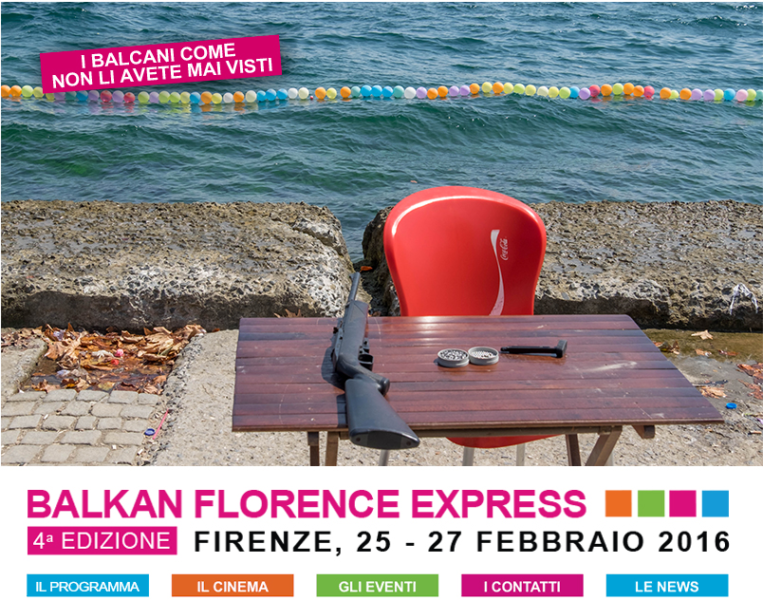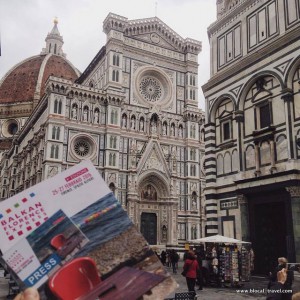 “Once I happened to be in Sarajevo during the Sarajevo Film Festival: I totally loved it”, Cecilia Ferrara confessed to me, a Balkan enthusiast who runs the Balkan Florence Express film festival together with Simone Malavolti.
“Once I happened to be in Sarajevo during the Sarajevo Film Festival: I totally loved it”, Cecilia Ferrara confessed to me, a Balkan enthusiast who runs the Balkan Florence Express film festival together with Simone Malavolti.
“I didn’t know anything about cinema back then, but I did know that I wanted to bring those movies to Italy”.
And she did it, thanks to support from Oxfam, a NGO that carries out humanitarian projects in the area of former Yugoslavia, dealing with social post-war issues as well as with migrants trying to reach western Europe via the Balkan route.
The 4th edition of the Balkan Florence Express featured both documentary films and movies on topics like memory and identity, family and youth, social issues and migration. Besides the screenings, a few collateral events took place: the launch of a book by Monica Baron and Marco Quinti, two photographers who travelled Bosnia Herzegovina far and wide reporting on the post-war aspects but also on the natural beauties and the artistic value of this country; the photo exhibition ‘Balkan Identity’ (by Fatjona Sejko and Francesca Dattilo) that meditates, through an original and very abstract approach, on what Balkan people have in common; a reading by Giusi Merli and Daniela Morozzi from Svetlana Broz’s book highlighting the stories of those who risked their own lives to protect their neighbours during the war; a conference about Yugoslav cinema with a very special guest: the acclaimed director Želimir Žilnik, one of the major figures of the Yugoslav Black Wave.
I should confess that I am not a cinema expert either but –as you might know by now-whatever feeds my Balkanlust sees me in the front row. Literally, in this case.
So, here are my unpretentious reviews of the nine movies screened at the Balkan Florence Express film festival. Honestly, I don’t know where you can find them, as the distribution for such movies is very off off off the mainstream circuit, but I’m telling you that they are worth a little effort in researching.
Balkan Florence Express > Lijepo mi je s tobom znaš (I like that super most the best), by Eva Kraljević (Croatia, 2015)
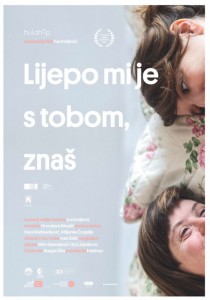
The movie speaks against a taboo in Croatian culture, whereby people who have a disability are not only discriminated against but also can’t benefit from concrete solutions that would smooth their social inclusion. But, despite all the difficulties and prejudices coming from ‘the world outside’, through Eva’s lens I could see a happy family, which shares lot of laughs, hugs and kisses, an overall sweetness clearly originating from Mia’s personality and hilarious character.
Here is the official trailer:
Balkan Florence Express > Goli (Naked Island) by Tiha K. Gudac (Croatia, 2014)
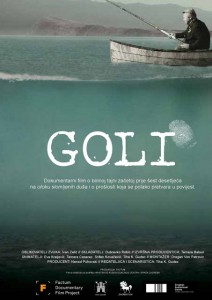
Tiha herself didn’t know what her grandfather’s big secret was or why his chest was covered with scars and, in order to make this documentary film, she had to address her questions to several relatives and family friends, picking up different family secrets and small pieces of information from each of them. These pieces of interviews meld together and shape this film, which -rather than a political documentary- is a very intimate movie investigating the relationships within Tiha’s family.
Here is the official trailer:
[Read about my day on Goli Otok]
Balkan Florence Express > Dječaci iz ulice Marksa i Engelsa (The kids from Marx and Engels street) by Nikola Vukčević (Montenegro, 2014)
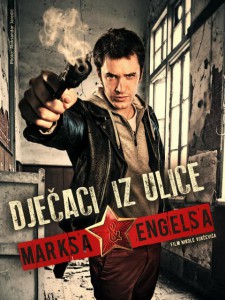
Back in Podgorica to deal with some unresolved issues, Stanko not only can’t recognize his hometown but not even the very street where he grew up, which, after the fall of the regime, had changed its name from ‘Marx and Engels street’ into ‘Moscow street’. His childhood friends had changed too: all of them were now part of Podgorica’s most questionable scene.
This is a movie about passion, revenge, crime and strong family bonds, in which different storylines cross and build up ties that –like bridges- link today’s Podgorica with its communist past.
Here are the two official trailers:
Balkan Florence Express > Krugovi (Circles) by Srdjan Golubović (Serbia, 2013)
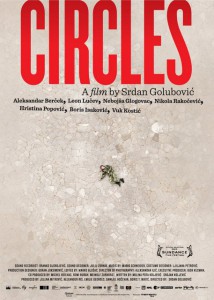
I especially loved the scene at the local cemetery, where Marko’s father and the son of one of the soldiers Marko had confronted are both mourning their own losses: a majestic parallelism showing how the harsh times of the war actually bond all former-Yugoslav people.
This film points out that new generations still carry the burden of the conflict, even several decades after the end of the war. Hard feelings are still there and more often than not they don’t arise from ethnic diversities but from individual situations, as well as from the peculiar past of a given family. They can spread and grow like circles in the water, but –luckily- good actions have the same power, as we saw from Marko’s heroic, spontaneous act, which brings ‘positive effects’ to the lives of those who knew him, even several years after his death and far away from Trebinje.
Here is the official trailer:
Balkan Florence Express > Rus (Russian), by Damir Ibrahimović and Eldar Emrić (Bosnia Hercegovina, 2015)
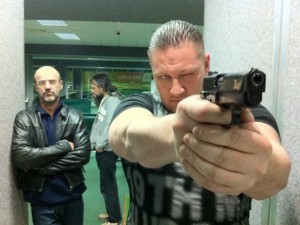
Anyway, through the rehearsal of the scenes based on the gangster’s true-story and his answers to the director’s straight inputs, we follow the rise and fall of this borderline character, whose adventurous life went through drugs, money, women, crime, Russian mafia, KGB friendships and, finally, debts and usurers: a life that was entwined with the social and economic aspects of the former eastern bloc.
Here is the official trailer:
Balkan Florence Express > Drevo (The tree), by Sonja Prosenc (Slovenia, 2014)
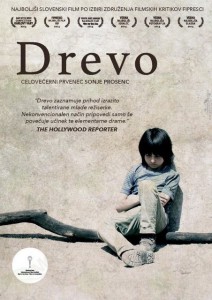
To keep pace with this extremely slow evolution of the plot, the movie bends over backwards in the photography, which more often than not borders on visual art. Every scene is staged as if it were a painting, every little detail reaches a poetic status, as it logically is when your life is confined to your own courtyard.
My favourite scene is Veli’s birthday party, when the pace of the film suddenly spices up and the three share a joyful moment of happiness while laughing and dancing to fast-paced Balkan music, despite the family tragedy they are living through.
Here is the official trailer:
Balkan Florence Express > Trapped by law, by Sami Mustafa (Kosovo, 2015)
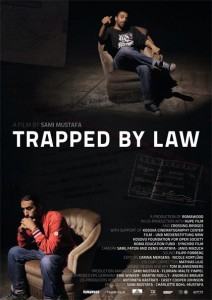
Thousands of Kosovo Romani people were forced to move back to Kosovo in 2010, despite having grown up in Germany, started a family in Germany, such as in Kefaet’s case, or even being born in Germany, like Selami. These two brothers were rappers back in Germany, therefore music plays a big role in the movie, being not only the true essence of Romani culture but also the key to their eventual integration into Kosovo society.
Nevertheless, the two brothers kept feeling German and never gave up on getting back to the country where they grew up and where their families and friends were still living. After several failed attempts to play along with the bureaucracy of the system, which refused to give them passports, visas and –ultimately- the permission to pick up their lives from where they had been suddenly interrupted (along with making them feel like criminals even if they hadn’t done anything wrong), the two brothers reached Germany illegally, crossing borders on foot.
Despite the dramatic topic, this documentary is kind of fun, thanks to the hilarious personalities of the two brothers.
Here is the official trailer:
Balkan Florence Express > Logbook_Serbistan, by Želimir Žilnik (Serbia, 2015)
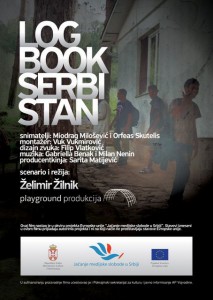
Besides the drama of leaving your own country hoping for a better life, this film shows how complicated immigration policies are, and how European countries are proving to be anything but welcoming towards refugees.
Here is the official trailer:
Balkan Florence Express > Babai, by Visar Morina (Kosovo, 2015)
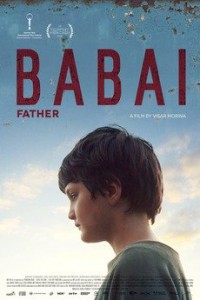
Far from being a happy ending, the reunification introduces the difficulties constantly faced by migrants, seen from the genuine point of view and limited understanding of a kid who is suddenly coming to terms with reality, whether it is the harsh, unwelcoming society into which they are trying to fit or the –perhaps harsher- awareness that his father is a human being like everyone else.
The actors playing the father and the son are both very talented and the chemistry between them is impressive: actually, that’s where the power of this story comes from.
Here is the official trailer:
And now, my personal Oscar nominations out of the Balkan Florence Express programme:
- Best original story: Dječaci iz ulice Marksa i Engelsa
- Best direction: Babai
- Best script: Krugovi
- Best photography: Drevo
- Best actor in a leading role: Goran Bodgan (Dječaci iz ulice Marksa i Engelsa – I’m totally in love with him, btw!!!)
- Best actor in a supporting role: Lukas Matija Rosas Uršič (Drevo)
- Best documentary feature: Goli
- Best soundtrack: Trapped by law
